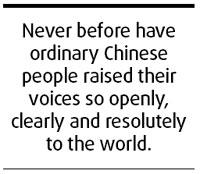Voices rise to counter biased Western media
By Xiong Lei (China Daily)
Updated: 2008-04-01 07:37
Updated: 2008-04-01 07:37
I feel grateful to the Western media for their distorted coverage of the recent riots in Lhasa and a few other places. Thanks to their distortion, a new force has arisen - the voices of ordinary Chinese people around the world.
They are telling the world through commentaries and videotapes on the Web, letters to politicians and the media, and by peaceful rallies and demonstrations that Tibet is, was and will always be part of China.
They are telling the world that the Chinese nation is composed of 56 ethnic groups and they all belong to one family. They want integration of their home. And they will say "No" to any attempt to split Tibet from China.

Never before have ordinary Chinese people raised their voices so openly, clearly and resolutely to the world on issues related to China's Tibet. As a journalist who has worked for nearly three decades in China's international communications, I feel an unprecedented reinforcement in these expressions.
This is real people power, not orchestrated by the Chinese government, but incurred by the Western media.
In fact, many of the critics of the Western media's distorted reports are also critical of the Chinese government and official media. However, they share the same bottom line, which is articulated by an unknown netizen at BBS of tianya.cn, a popular Chinese portal:
"However dissatisfied I am with my salary, I won't support the Taiwan secessionists; and
"However disappointed I am in my life, I won't do anything to dissociate my nation."
Actually, this is a political position of the grassroots Chinese spanning different age groups in different countries. As elaborated by a netizen identified as "akaaaa" and a law major: "We Chinese no longer harbor a blind faith in Western media's reports and we have learned to make our own analysis."
My friend Zhou Jun, an engineer with a local TV station in Sichuan, is a good example. He had just suffered a cut in his salary when the riots in Lhasa broke out. The incident could have nothing to do with his personal life and gains.
Yet he was so indignant at the nature of the riots and the Western media's crooked coverage that he cast away his personal troubles and occupied himself collecting commentaries and facts showing the truth of the issue, which he published in his blog at bolianshe.com.
Through Zhou and his blog, I came to know other overseas Chinese, who also went beyond themselves to condemn the Western media and the Dalai clique with reason and facts.
Out of his conscience for justice, a netizen named "houjibofa" - "deep accumulation but rarely fire" - took pains to translate some of the Western media's reports into Chinese and refuted them paragraph by paragraph on an overseas Chinese website called talkcc.net.
Another overseas netizen identified as "laone" - "this old monk" - had quit writing online for several years. But the recent event drove the linguistic professor to write several letters to a local newspaper protesting its biased reports on Tibet. Ignored, he returned to the website to share his experiences and feelings with more people.
All this indignation and passion have been ignited by the Western media's biased reports about what took place in Tibet. Perhaps the official Chinese media may be clumsy, but at least they are not as hypocritical as the Western media which always claims to be impartial, yet are actually biased on many issues related to China.
If people are entitled to have their voices heard, it should not be only those of the Dalai Lama and Tibetans in exile. But voices other than theirs are often missing in the Western media. Tibetans who are peacefully living and working in their home of Tibet Autonomous Region and elsewhere never get the limelight given to those secessionists, let alone Han people and other ethnic groups.
Even the overseas rallies expressing the Chinese people's position for their country's integrity and sovereignty are not fairly covered. The Toronto rally over the weekend, for instance, drew little attention from the major Western media. The few who did cover the event focused on one or two Tibetans in exile rather than the hundreds of participants insisting Tibet is part of China.
Such actions on the part of the Western media gives the lie to their "impartiality" and makes a mockery of "freedom of the press".
As "laone" noted: "I used to belong to the rightist wing, but all of a sudden I found myself a liberal leftist." And he attributed the change to the Western media.
The Western media indeed serves as a negative teacher for the Chinese public, and their education is much more effective than our state media, that pure freedom of the press is impossible.
That is why I wish to thank these good teachers sincerely.
The author is a council member of China Society for Human Rights Studies
|
||
|
||
|
|
|
|